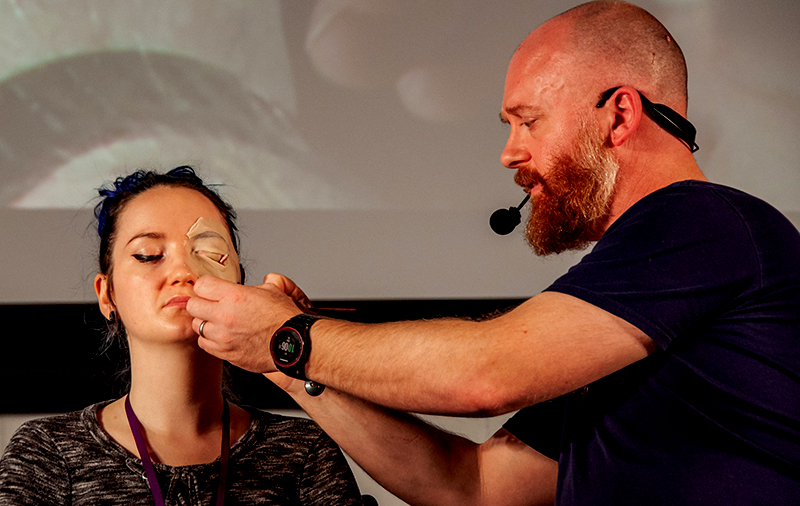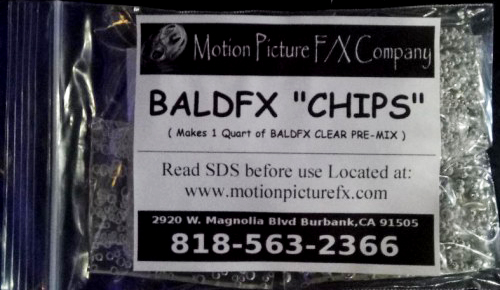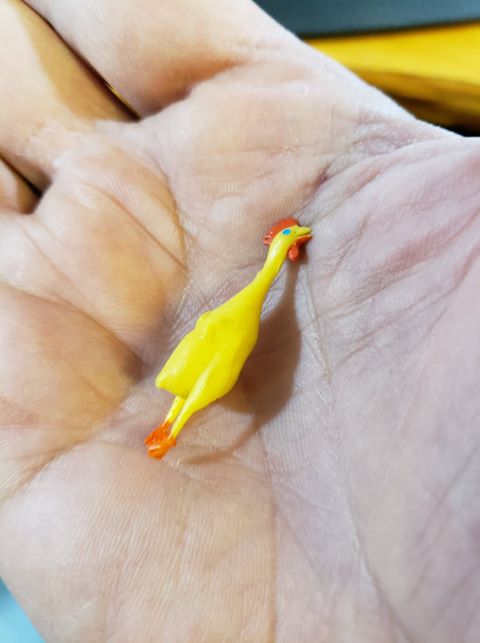
Something that Don talked about passionately in our interview was how (mostly) young, creative people can be in a position to get taken advantage of. When working starting out, you are not likely to be handed a position of massive responsibility with large sums of money and heavy hitting clients.
So it stands to reason when the phone first rings, it’s likely to be a smaller production with little or no budget looking for some help and played right it can be a wonderful place to start.
In this episode, we chat about this with a word of warning and a method of understanding your worth so that if you find yourself in this position, you can check yourself and your fluctuating emotions against the empirical gauge of common sense.
Stream or download below, we are also on Spotify, iTunes, Soundcloud…wherever you get podcasts! Subscribe in your podcatcher to make sure you don’t miss the latest episodes!
Halloween Horrors
We also wax lyrical about plain dangerous Halloween makeups which we have seen. Every year, a plethora of inappropriate objects are attached to eyes and noses in an attempt to get likes and attention.
There isn’t anything wrong with that, unless of course actual harm can come about from doing so. Using sharp things on the skin is a no-no. In the latest Prosthetics Event and Prosthetics Magazine, Todd and I covered a safe way of doing one such gag.

Claire Golby kindly lent me face so I could slam a screwdriver into her eye. Kind of. No Claires were harmed in the making of this demo.
Yes, it is time-consuming and takes effort.
I realise it may not have looked that hard the on the gameshow ‘Face Off‘. Also, not many people are looking to hire someone who is always seeking to do the bare minimum either, so if that upsets you, best keep walking, buttercup.
The prosthetics Event 2018
I had a great time, with four different stage spots throughout the day. One such highlight was chatting to Christopher Nelson who headed up the small team for the new Halloween movie. We chatted a lot about the act of making, how it feels to fail and how to address those sensations in order to keep going. We also talked about smashing in faces and bleeding gags, just your usual prosthetic get together chit-chat!

I also got to talk lenses with the team from Cantor Nissel who make lenses and eyes for both medical and theatrical uses. It was a real education, and something we will look into more in upcoming episodes.
Next year the show will be even bigger and better!
New Cap Plastic
Thanks to the Motion Picture FX guys for sending me a sample of their new BALDFX “CHIPS”. I tried it and loved it – so soft and flexible, it makes a great encapsulant for appliances as well as for bald caps.

So, the main course of this post and episode is to throw a spotlight on how to be aware of being taken advantage of when you are a creative desperate for a shot!
1 – You’re new here, right?
Ok, so you’re new to this. Maybe you have just left makeup school/a different career path or job/ made a new life for yourself but now the first opportunity comes along and you have nothing to compare yourself against to know what is expected of you. You don’t want to appear too harsh in case you scare them off, nor do you want to be a pushover.
Understand that we all must get by. Life costs money. Standing still and doing nothing costs you money. A great exercise is to sit down with a calculator, tot up all your outgoings for a year.
- Add up your rent/mortagage payments, car, fuel, food, utilities, phone, computer, insurances and whatever else allows you to function for any given year.
- Add it all up and divide that number by 365.
- That number it gives you is how much it costs to stand still for one day.
You need to make at least that each day to break even and to be able to afford to come back tomorrow. You presumably need to make a profit, so that when you are sick, older or want a better set of circumstances, you will have accumulated enough to tide you over.
Using this is the starting point you can see that your time really shouldn’t ever be free. How much you can charge for your time depends on what you can offer the client. Remember, a client will only pay for the problems that you can solve for them.
This little thought experiment applies to most people, including the people who are asking you to do something for them. It maybe but the person who contacts you doesn’t have any creative experience and has no idea how much effort goes into something or how much material may cost and consequently places little value on what you may bring. Part of your remit is to ensure you get what you need to be able to perform the tasks properly.
There are a couple of great files on the Neill Gorton Makeup FX 911 Facebook page which cover some good ground a freelancer should consider when making themselves available for work. (If you are not a memer, I would consider joining. It’s free and packed with great info)
- Todds Post: How Much to Charge?
- Naomi Lynch : The Psychology of Business, or Why your Mind matters as much as your Mould…
2 – What do they need, and what do you need in order to do it?
If you’re new to the business and you have limited experience, then it is not reasonable for you to be expected to do incredibly complicated things beyond your ability. Very important therefore to have a clear accurate measure of what you can do and how you sit within the scale of ability. If people are hiring somebody do you do something for a very complicated involved project, then they should find somebody appropriately skilled and capable of doing this job.
If you know this is not you then you really should not take the job on in the first place. There’s no shame in turning down something that you know is beyond your ability because if you take it on any can’t do it it’s going to do everyone more harm than good. It’s important that you push yourself a little but not take on more than you can possibly do.
If you can do the job, you then need to make sure you have enough time and resources.
A lot of people feel bad about asking for money when doing a job. Remember, we have established it costs money to stand still and do absolutely nothing at all. This being the case you will need to cover those costs and of course cover any materials you need to use or replace and be compensated for any time that you put towards the job.
Budgeting and working out how much a job costs comes with experience and the more you do it the more you know how you work and how quickly you can do things.
You will need to work out what your day rate is; that is the amount you should charge per day to cover your costs, plus whatever materials you need to acquire in order do the job.
It absolutely is not okay for you to pay for materials out of your own money. This is a business expense and needs to be covered by the production.
If the production on not willing to pay for the materials that you require to do the job then I would take that as a red flag right there and walk away. Keep in mind that no matter who does this job, they will have to get those materials. If you are afraid that asking for material costs will mean they will simply go elsewhere, consider the fact that whoever they get in will have to buy those materials also.
Make sure you have a clear understanding of what they need and what they are expecting from you. If what they are asking for and what they are offering you as compensation is unrealistic or untenable then there is good reason to decline the work. You could soften the blow by suggesting colleagues all friends or associates that may be able to help
Very often there is little to no budget for these things and it’s possible they simply can’t pay anything. I myself have done a few of these jobs in the past purely to gain experience, and to be motivated to produce things which I can then use to fill out my portfolio.
If you can get some kind of benefit from it whether it’s great photography, chance to work with an up and coming group of people, the experience or simply because it is fun then there those are good reasons and the benefits which can offset the trouble you go to. Just beware that you can’t continually do this because it simply will use you up.
3 – Feel good about walking away
It’s not uncommon for people to think that if they rock the boat by asking for things that they need, they will somehow sabotage their future and that the client has this amazing connection to the industry that they love.
This is all highly unlikely for one good reason.
If the client is such a big shot then why have they not simply gone to an established company and paid big bucks for the job to be done?
I’m guessing the reason they have asked somebody straight out of college or with little experience is because they cannot afford it or have no influence elsewhere to command such mighty favours.
This being the case it’s always pays to do a little bit of research on who is hiring you so that you can see what they have done before and what kind of calibre of work they have been responsible for. It also means you can figure out whether they are full of shit or not too.
Consider also what else this production is spending money on to have a good idea of where they are spending it. Do they have any celebrity names attached to the project? Are they filming in a major studio? Are they filming this using expensive cameras with expensive lenses and expensive lights? Do they have catering and location costs?
If the answer to any of these questions is yes then, there has been some money apportioned and it’s only reasonable that your minimum costs be met in order to pay for it. If they’ve got money to do some of these things and are specifically withholding it from your department, there’s a good chance that this is just a predatory manoeuvre on their part to try and get something for nothing.
If you end up paying for materials out of your own pocket for any production, then you are no longer a makeup artist, but a partial financer of the production. A producer if you will. Think about that.
If you go in with your eyes wide open and you are aware that this is the case, and you can afford the time to do this for the joy of it or to get some experience … that’s perfectly acceptable. Just be aware of what your responsibilities are and make sure you are being treated fairly.
This is not to say that all such opportunities are there to screw people over, but if you apply some simple logical thought and can understand what the job is and where you fit into the equation, you can have a lot of fun learning your craft.
Stream or download below, we are also on Spotify, iTunes, Soundcloud…wherever you get podcasts! Subscribe in your podcatcher to make sure you don’t miss the latest episodes!
Thanks again for listening, and if you would like to support us, as ever there is one thing you can do that helps more than anything – tell someone else about the podcast! Share this on social media and tell us how we are doing!
You can email us here direct at stuartandtodd@gmail.com
We appreciate your attention!
– Stuart & Todd

